#DataCamp DataScience
Explore tagged Tumblr posts
Text
From Math to Machine Learning: A Comprehensive Blueprint for Aspiring Data Scientists
The realm of data science is vast and dynamic, offering a plethora of opportunities for those willing to dive into the world of numbers, algorithms, and insights. If you're new to data science and unsure where to start, fear not! This step-by-step guide will navigate you through the foundational concepts and essential skills to kickstart your journey in this exciting field. Choosing the Best Data Science Institute can further accelerate your journey into this thriving industry.
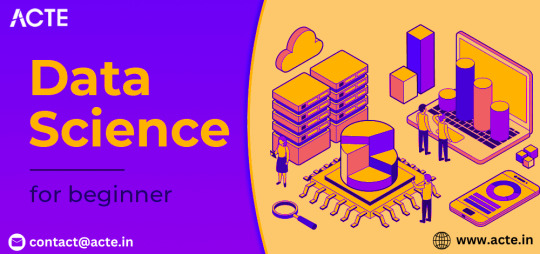
1. Establish a Strong Foundation in Mathematics and Statistics
Before delving into the specifics of data science, ensure you have a robust foundation in mathematics and statistics. Brush up on concepts like algebra, calculus, probability, and statistical inference. Online platforms such as Khan Academy and Coursera offer excellent resources for reinforcing these fundamental skills.
2. Learn Programming Languages
Data science is synonymous with coding. Choose a programming language – Python and R are popular choices – and become proficient in it. Platforms like Codecademy, DataCamp, and W3Schools provide interactive courses to help you get started on your coding journey.
3. Grasp the Basics of Data Manipulation and Analysis
Understanding how to work with data is at the core of data science. Familiarize yourself with libraries like Pandas in Python or data frames in R. Learn about data structures, and explore techniques for cleaning and preprocessing data. Utilize real-world datasets from platforms like Kaggle for hands-on practice.
4. Dive into Data Visualization
Data visualization is a powerful tool for conveying insights. Learn how to create compelling visualizations using tools like Matplotlib and Seaborn in Python, or ggplot2 in R. Effectively communicating data findings is a crucial aspect of a data scientist's role.
5. Explore Machine Learning Fundamentals
Begin your journey into machine learning by understanding the basics. Grasp concepts like supervised and unsupervised learning, classification, regression, and key algorithms such as linear regression and decision trees. Platforms like scikit-learn in Python offer practical, hands-on experience.
6. Delve into Big Data Technologies
As data scales, so does the need for technologies that can handle large datasets. Familiarize yourself with big data technologies, particularly Apache Hadoop and Apache Spark. Platforms like Cloudera and Databricks provide tutorials suitable for beginners.
7. Enroll in Online Courses and Specializations
Structured learning paths are invaluable for beginners. Enroll in online courses and specializations tailored for data science novices. Platforms like Coursera ("Data Science and Machine Learning Bootcamp with R/Python") and edX ("Introduction to Data Science") offer comprehensive learning opportunities.
8. Build Practical Projects
Apply your newfound knowledge by working on practical projects. Analyze datasets, implement machine learning models, and solve real-world problems. Platforms like Kaggle provide a collaborative space for participating in data science competitions and showcasing your skills to the community.
9. Join Data Science Communities
Engaging with the data science community is a key aspect of your learning journey. Participate in discussions on platforms like Stack Overflow, explore communities on Reddit (r/datascience), and connect with professionals on LinkedIn. Networking can provide valuable insights and support.
10. Continuous Learning and Specialization
Data science is a field that evolves rapidly. Embrace continuous learning and explore specialized areas based on your interests. Dive into natural language processing, computer vision, or reinforcement learning as you progress and discover your passion within the broader data science landscape.
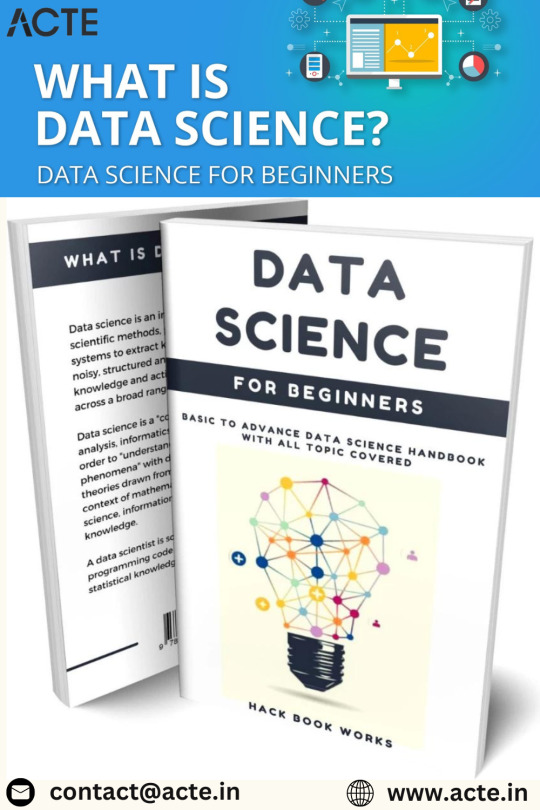
Remember, your journey in data science is a continuous process of learning, application, and growth. Seek guidance from online forums, contribute to discussions, and build a portfolio that showcases your projects. Choosing the best Data Science Courses in Chennai is a crucial step in acquiring the necessary expertise for a successful career in the evolving landscape of data science. With dedication and a systematic approach, you'll find yourself progressing steadily in the fascinating world of data science. Good luck on your journey!
3 notes
·
View notes
Text
How do I learn data science online?

Curious, David loved puzzles. Stories of magic achieved with data had inspired him to learn the art of data science. Now, with an enormous amount of online resources available literally at his fingertips, the question was where to start.
The journey began from the basics. Online platforms like Lejhro introduced him to the fascinating world of statistics and probability. Interactive lessons on data distributions, hypothesis testing, and so on demystified the concepts and provided a firm foundation for his adventure in data science.
Next came the challenge of Python, fondly called the language of data. From sites like Lejhro and DataCamp, it had clear, step-by-step tutorials. David learned how to tame data with NumPy and Pandas—to take the raw chaos and turn it into an organized dataset. It was highly addictive to see disorder turned into structure.
Theory without practice is like a car without Gas. To David, Kaggle served as a playground, a treasure trove of data. He started by looking for small things like ratings on IMDB movies and discovered hidden patterns and trends. The more confident he got, the more complex the challenges he eventually mastered—quite helpful in cementing the principles of data science.
An online community turned out to be a hidden strength for him. The likes of virtual classes were found on platforms like Reddit's r/datascience and The Data Science Lounge. A much-needed extension toward learning came from interchanging with experienced data scientists and other learners like him. Sharing doubts, celebrating successes, and learning from others fueled his growth.
David's story really illustrates that anyone with the will and proper resources can start a journey in data science. Start small, give regard to your milestone accomplishments, and lean on the community online. This provides a solid base to be propelled into an exciting world of machine learning and beyond, opening doors to fulfilling careers in data science.
0 notes
Text
Embarking on a Data Analyst Career
In today's data-driven world, data analysts play a crucial role in helping organizations make informed decisions by interpreting and visualizing data. If you're considering a career as a data analyst, this guide will outline the essential steps to get you started on this rewarding path. Enrolling in a respected Data Analytics training in Pune and help people who want to become experts in the field gain the skills and information necessary to successfully navigate this ever-changing environment.

Understanding the Data Analyst Role
Before diving into the technical skills, it's important to understand what a data analyst does. The primary responsibilities of a data analyst include collecting, processing, and performing statistical analyses on data. They identify trends, create visualizations, and provide actionable insights to support decision-making processes.
Building Essential Skills
To become a successful data analyst, you need to develop a strong foundation in several key areas:
Mathematics and Statistics
A solid understanding of statistics and probability is crucial. Concepts like mean, median, standard deviation, hypothesis testing, and regression analysis are frequently used in data analysis. For those keen to excel in data analytics, enrolling in Data Analytics Online Course can be highly advantageous. Such a program provides a unique opportunity to acquire comprehensive knowledge and practical skills crucial for mastering data analytics.
Programming Proficiency
Python and R are popular programming languages in data analysis due to their powerful libraries and ease of use. Start with the basics of one of these languages and gradually move on to data manipulation and analysis libraries like Pandas, NumPy, and Matplotlib in Python, or Tidyverse in R.
Data Manipulation and Visualization
Learning SQL (Structured Query Language) is essential for extracting and manipulating data from databases. Additionally, mastering data visualization tools such as Tableau, Power BI, or even Excel will help you present your findings effectively.
Domain Knowledge
Understanding the industry you’re working in can significantly enhance your ability to interpret data and provide valuable insights. Whether it’s finance, healthcare, marketing, or any other field, domain knowledge will give you context and improve your analytical capabilities.
Educational Pathways
There are multiple ways to gain the necessary education and skills for a data analyst role:
Formal Education
Many data analysts have degrees in fields such as mathematics, statistics, computer science, economics, or engineering. While a formal degree is beneficial, it is not strictly necessary.
Online Courses and Certifications
Numerous online platforms offer courses and certifications in data analysis. Websites like Coursera, edX, Udacity, and DataCamp provide comprehensive programs covering everything from the basics to advanced topics.
Gaining Practical Experience
Hands-on experience is crucial for becoming proficient in data analysis. Here are some ways to gain practical experience:
Projects
Work on personal or open-source projects. Analyze publicly available datasets on platforms like Kaggle. These projects will not only enhance your skills but also serve as a portfolio to showcase to potential employers.
Internships
Internships provide valuable real-world experience and can often lead to full-time positions. Look for internships in companies that prioritize data-driven decision-making.
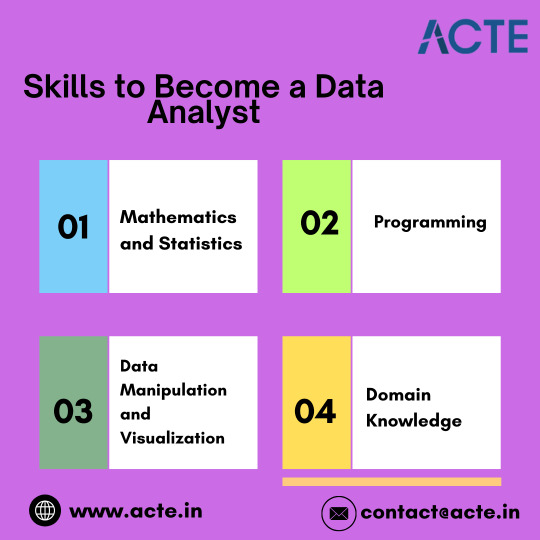
Networking and Community Involvement
Joining data analysis communities can provide support, resources, and opportunities for collaboration. Participate in forums like Reddit’s r/datascience, attend local meetups, or join online groups on LinkedIn. Networking with professionals in the field can lead to mentorship opportunities and job referrals.
Building a Strong Portfolio
A portfolio is a critical tool for showcasing your skills and experience. Include projects that demonstrate your ability to analyze data, create visualizations, and provide insights. Document your process and highlight the impact of your work.
Job Hunting and Continuous Improvement
When you feel confident in your skills, start applying for entry-level data analyst positions. Tailor your resume to highlight relevant skills and experiences. Prepare for interviews by practicing common data analysis interview questions and case studies.
Data analysis is a continuously evolving field, so stay updated with the latest trends, tools, and techniques. Engage in lifelong learning through advanced courses, reading industry blogs, and participating in webinars and conferences.
Conclusion
Starting a career as a data analyst requires a combination of education, practical experience, and continuous learning. By understanding the role, acquiring relevant skills, gaining hands-on experience, networking, and building a strong portfolio, you can successfully embark on your journey in this exciting and impactful field. With dedication and perseverance, you'll be well on your way to becoming a proficient data analyst. Happy analyzing!
0 notes
Text
Best DataScience with Generative AI Course | Data Science Online Training
Understanding Data Science? Your Gateway to a Promising Career
What is Data Science?
Best DataScience with Generative AI Course is an interdisciplinary field that combines statistical methods, data analysis, machine learning, and domain expertise to extract meaningful insights and knowledge from structured and unstructured data. It involves collecting, processing, analyzing, and interpreting large amounts of data to make informed decisions, predict trends, and solve complex problems. Best DataScience with Generative AI Course

Key Components of Data Science
Data Cleaning and Preparation: Removing errors, handling missing values, and transforming raw data into a usable format.
Exploratory Data Analysis (EDA): Using statistical tools and visualization techniques to understand the data's underlying patterns.
Model Building: Applying machine learning algorithms to build predictive or descriptive models.
Deployment: Implementing the model in a real-world environment to provide actionable insights.
Communication: Presenting findings and recommendations to stakeholders through reports, dashboards, and visualizations.
Why Choose a Career in Data Science?
High Demand: Data science skills are in high demand across various industries, including finance, healthcare, marketing, and technology.
Lucrative Salaries: Data scientists are among the highest-paid professionals due to their expertise and the value they bring to organizations.
Diverse Opportunities: Data science offers opportunities to work in various roles such as data analyst, data engineer, machine learning engineer, and business intelligence analyst.
Continuous Learning: The field is constantly evolving, offering endless learning and growth opportunities.
Best Data Science Courses Online
Coursera - Data Science Specialization by Johns Hopkins University:
A comprehensive 10-course program covering the data science process, R programming, data cleaning, and analysis.
Suitable for beginners and includes hands-on projects.
Kaggle - Learn Data Science:
Offers free micro-courses on various data science topics, including Python, machine learning, and data visualization.
Great for hands-on practice and competitions to hone your skills.
DataCamp - Data Scientist with Python Track:
A beginner-friendly track that teaches Python programming, data manipulation, and machine learning. Best DataScience with Generative AI Course
Includes interactive coding exercises and projects.
Conclusion
Data science is a dynamic and rewarding field that offers numerous opportunities for growth and development. By enrolling in the best online courses, you can build a strong foundation and advance your career in this exciting domain. Whether you are a beginner or an experienced professional, continuous learning is key to staying ahead in the ever-evolving world of data science.
Visualpath is the Leading and Best Institute for learning in Hyderabad. We provide Best DataScience with Generative AI Course you will get the best course at an affordable cost.
Attend Free Demo
Call on – +91-9989971070
WhatsApp: https://www.whatsapp.com/catalog/917032290546/
Visit blog: https://visualpathblogs.com/
Visit: https://visualpath.in/salesforce-devops-online-training.html
#DataSciencewithGenerativeAICourse#DataSciencewithGenerativeAITrainingHyderabad#DataScienceCourseOnlineTraining#DataScienceTraininginHyderabad#DataScienceTraininginAmeerpet#DataScienceTrainingInstitutesinHyderabad#DataScienceCourseTraininginHyderabad#BestDataScienceCourseinHyderabad#DataSciencewithGenerativeAIOnlineTraining#BestDataScienceTrainingCourse
0 notes
Text
Starting Your Data Science Adventure: Beginner-Friendly Tips and Resources
In today's data-driven world, Python programming has emerged as a powerhouse for data science. If you're curious about diving into this exciting field, you're in the right place! Whether you're a complete beginner or have some programming experience, this guide will equip you with the essential tips and resources to start your data science adventure with Python.
1. Why Python for Data Science?
Python has become a go-to language for data science due to its simplicity and versatility. It offers a wide range of libraries and frameworks tailored for data analysis, visualization, and machine learning. Plus, its readability makes it a favorite among beginners and seasoned professionals alike.
2. Getting Started with Python
If you're new to Python, don't worry! Getting started is easier than you might think. Begin by installing Python on your computer. You can download it for free from the official Python website (python.org). Choose the latest stable version, and follow the installation instructions for your operating system.
3. Understanding Python Basics
Before delving into data science, familiarize yourself with Python's basic syntax and principles. Online platforms like Codecademy and Coursera offer free introductory Python courses. These courses cover fundamental topics such as variables, data types, loops, and functions. Remember, a solid foundation in Python will serve as a strong pillar for your data science journey.
4. Exploring Data Science Libraries
One of Python's strengths lies in its vast array of libraries designed for data science. Three essential libraries you'll encounter frequently are:
NumPy: For numerical computing and handling arrays.
Pandas: Ideal for data manipulation and analysis, especially with tabular data.
Matplotlib & Seaborn: These libraries excel in data visualization, helping you create insightful plots and graphs.
5. Hands-On Projects
The best way to learn is by doing! Start with small data science projects to apply your Python skills. For instance, you could:
Analyze a dataset of your favorite movies, exploring trends and ratings.
Predict housing prices using a dataset from platforms like Kaggle.
Classify images of handwritten digits using machine learning algorithms.
6. Online Courses and Tutorials
Numerous online resources offer comprehensive data science courses with a focus on Python. Websites like Udemy, DataCamp, and edX host courses ranging from beginner to advanced levels. These courses often include video lectures, coding exercises, and real-world projects to reinforce your learning.
7. Joining Data Science Communities
Immerse yourself in the vibrant data science community! Platforms like Stack Overflow and Reddit's r/datascience are excellent places to ask questions, seek advice, and connect with fellow learners and professionals. Participating in discussions and reading others' experiences can provide valuable insights and motivation.
8. Books for Data Science with Python
Books are timeless resources for learning. Consider adding these titles to your reading list:
"Python for Data Analysis" by Wes McKinney: A comprehensive guide to using Python for data manipulation and analysis with Pandas.
"Hands-On Machine Learning with Scikit-Learn, Keras, and TensorFlow" by Aurélien Géron: Dive into practical machine learning with Python's popular libraries.
9. Practice, Patience, and Perseverance
Data science, like any skill, requires practice and patience. Don't be discouraged by challenges; instead, view them as opportunities to learn and grow. Dedicate time each day to coding and exploring new concepts. Celebrate your progress, no matter how small, and stay curious about the vast possibilities of Python in data science.
Conclusion
Embarking on a data science journey with Python is an exciting and rewarding endeavor. By following these beginner-friendly tips and leveraging the abundant resources available, you'll build a solid foundation for your exploration of data analysis, machine learning, and beyond. Remember, the key ingredients for success are curiosity, persistence, and a willingness to learn. Happy coding!
0 notes
Text
How do I study data science and machine learning?
Studying data science and machine learning can be an exciting journey! Here's a structured approach to get you started:
1. *Understand the Basics*: Ensure you have a solid understanding of mathematics (especially linear algebra, calculus, and probability/statistics) and programming (Python is commonly used in data science and machine learning).
2. *Learn Python*: Python is the most widely used programming language in data science and machine learning due to its simplicity and versatility. Start with basic Python programming and then move on to libraries such as NumPy, Pandas, Matplotlib, and Scikit-learn.
3. *Study Data Analysis and Visualization*: Learn how to clean, preprocess, analyze, and visualize data using libraries like Pandas, Matplotlib, and Seaborn. Understanding your data is crucial before applying machine learning algorithms.
4. *Explore Machine Learning Concepts*: Familiarize yourself with different machine learning algorithms (supervised, unsupervised, and reinforcement learning), how they work, and when to use them. Concepts like classification, regression, clustering, and dimensionality reduction are essential.
5. *Deepen Your Knowledge*: Dive into more advanced topics such as deep learning, natural language processing (NLP), computer vision, and reinforcement learning. TensorFlow and PyTorch are popular libraries for deep learning.
6. *Practice, Practice, Practice*: Apply what you learn by working on projects. Kaggle is an excellent platform for finding datasets and participating in machine learning competitions. Also, consider working on real-world problems or contributing to open-source projects.
7. *Stay Updated*: The field of data science and machine learning is rapidly evolving. Stay updated with the latest research papers, blogs, online courses, and tutorials.
8. *Join Communities*: Engage with the data science and machine learning community through forums like Stack Overflow, Reddit (r/datascience, r/machinelearning), and data science meetups. Networking with professionals in the field can provide valuable insights and opportunities.
9. *Take Online Courses or Bootcamps*: There are many online courses and bootcamps tailored to data science and machine learning. Platforms like Coursera, Udacity, edX, and DataCamp offer comprehensive programs taught by industry experts.
10.*Build a Portfolio*: Showcase your skills and projects by creating a portfolio on platforms like GitHub or personal websites. A strong portfolio can greatly enhance your chances of landing internships or job opportunities in the field.
Remember that learning data science and machine learning is a continuous process, so be patient and persistent in your studies. Good luck on your learning journey!
Data science course in chennai
Data analytics course in chennai
Data science training institute in chennai
0 notes
Text
Getting Started with Data Science: A Beginner's Roadmap
Are you intrigued by the world of data science but feeling overwhelmed about where to begin? The demand for data-savvy professionals is soaring, making data science a lucrative field to explore. If you're a beginner eager to dive in, follow this roadmap to kickstart your journey into data science from the best data science course in Bangalore.

1. Master the Basics:
Before diving into data science, ensure you have a solid grasp of foundational concepts in mathematics, statistics, and programming. Concepts like algebra, calculus, probability, and basic programming skills are essential prerequisites.
2. Learn Programming Languages:
Python and R are the go-to languages for data science. Start by mastering one of these languages as they are widely used for data manipulation, analysis, and visualization. There's an abundance of online tutorials and courses available to help you get started with Python or R.
3. Explore Data Analysis and Visualization:
Once you're comfortable with programming basics, delve into data analysis and visualization libraries like Pandas, NumPy, Matplotlib, and Seaborn (for Python) or ggplot2 (for R). These libraries are indispensable for exploring and visualizing datasets effectively.
4. Dive into Machine Learning:
Machine learning forms the core of data science. Begin by understanding fundamental algorithms such as linear regression, logistic regression, decision trees, and k-nearest neighbors. Explore libraries like Scikit-learn (Python) or caret (R) to implement machine learning models.
If you want to learn more about Data Science, I highly recommend the Data Science online training because they offer certifications and job placement opportunities. You can find these services both online and offline.
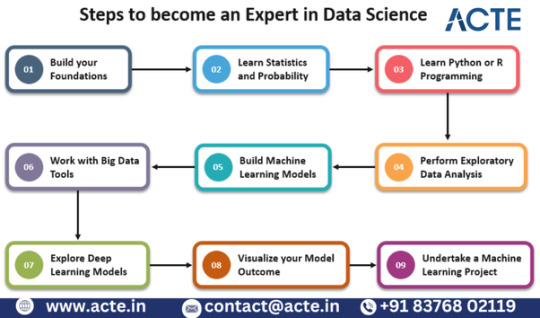
5. Practice with Real-world Projects:
To reinforce your understanding, work on real-world data science projects. Platforms like Kaggle, GitHub, and DataCamp offer a plethora of datasets and project ideas for hands-on practice. Engaging in practical projects will help you apply your skills to solve real-world problems.
6. Stay Updated with Online Courses and Resources:
The field of data science is dynamic and continuously evolving. Stay abreast of the latest trends and techniques by enrolling in online courses offered by platforms like Coursera, Udacity, or edX. These platforms offer comprehensive data science curriculums taught by industry experts.
7. Join Data Science Communities:
Connect with like-minded individuals by joining online communities and forums such as Reddit's r/datascience, Stack Overflow, or Data Science Central. Engaging with these communities provides an avenue to ask questions, share knowledge, and stay motivated throughout your learning journey.
Conclusion:
Embarking on a journey to learn data science requires dedication, perseverance, and a continuous thirst for learning. By mastering programming languages, understanding data analysis and visualization, delving into machine learning, and actively working on real-world projects, you'll be well-equipped to navigate the exciting field of data science.
0 notes
Photo

Using DataCamp for getting familiar with Data Science concepts
This is a short preview of the article: I am sharing a collection of classes in DataCamp that may help you in getting familiar with data science concepts in a practical manner. DataCamp is a paid service, however, students can normally use it for free. Probably the university where you are studying have an institutional subscription
If you like it consider checking out the full version of the post at: Using DataCamp for getting familiar with Data Science concepts
If you are looking for ideas for tweet or re-blog this post you may want to consider the following hashtags:
Hashtags: #Data, #DataScience, #Datacamp, #Python, #Tensorflow
The Hashtags of the Categories are: #BigData, #MachineLearning, #Programming, #Python
Using DataCamp for getting familiar with Data Science concepts is available at the following link: https://francescolelli.info/big-data/using-datacamp-for-getting-familiar-with-data-science-concepts/ You will find more information, stories, examples, data, opinions and scientific papers as part of a collection of articles about Information Management, Computer Science, Economics, Finance and More.
The title of the full article is: Using DataCamp for getting familiar with Data Science concepts
It belong to the following categories: Big Data, Machine Learning, Programming, Python
The most relevant keywords are: data, Data Science, Datacamp, Python, Tensorflow
It has been published by Francesco Lelli at Francesco Lelli a blog about Information Management, Computer Science, Finance, Economics and nearby ideas and opinions
I am sharing a collection of classes in DataCamp that may help you in getting familiar with data science concepts in a practical manner. DataCamp is a paid service, however, students can normally use it for free. Probably the university where you are studying have an institutional subscription
Hope you will find it interesting and that it will help you in your journey
I am sharing a collection of classes in DataCamp that may help you in getting familiar with data science concepts in a practical manner. DataCamp is a paid service, however, students can normally use it for free. Probably the university where you are studying have an institutional subscription or, if that is not the case,…
1 note
·
View note
Text
Cracking the Code: A Beginner's Roadmap to Mastering Data Science
Embarking on the journey into data science as a complete novice is an exciting venture. While the world of data science may seem daunting at first, breaking down the learning process into manageable steps can make the endeavor both enjoyable and rewarding. Choosing the best Data Science Institute can further accelerate your journey into this thriving industry.
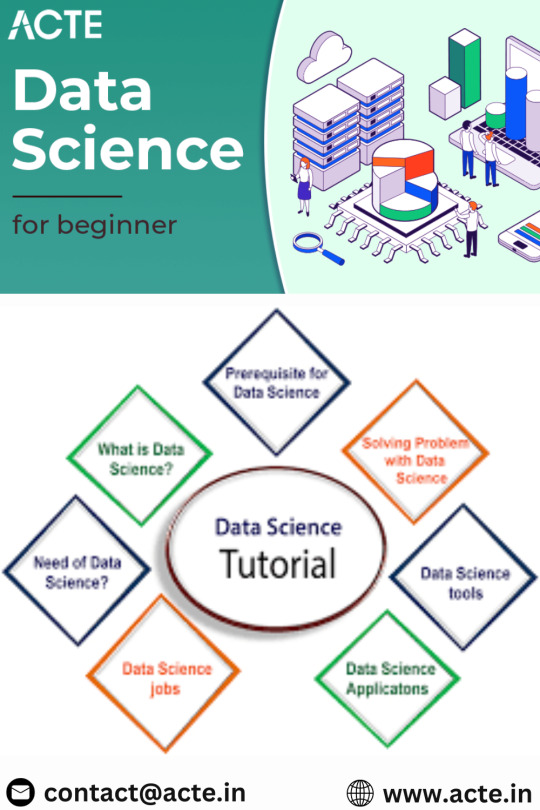
In this comprehensive guide, we'll outline a roadmap for beginners to get started with data science, from understanding the basics to building a portfolio of projects.
1. Understanding the Basics: Laying the Foundation
The journey begins with a solid understanding of the fundamentals of data science. Start by familiarizing yourself with key concepts such as data types, variables, and basic statistics. Platforms like Khan Academy, Coursera, and edX offer introductory courses in statistics and data science, providing a solid foundation for your learning journey.
2. Learn Programming Languages: The Language of Data Science
Programming is a crucial skill in data science, and Python is one of the most widely used languages in the field. Platforms like Codecademy, DataCamp, and freeCodeCamp offer interactive lessons and projects to help beginners get hands-on experience with Python. Additionally, learning R, another popular language in data science, can broaden your skill set.
3. Explore Data Visualization: Bringing Data to Life
Data visualization is a powerful tool for understanding and communicating data. Explore tools like Tableau for creating interactive visualizations or dive into Python libraries like Matplotlib and Seaborn. Understanding how to present data visually enhances your ability to derive insights and convey information effectively.
4. Master Data Manipulation: Unlocking Data's Potential
Data manipulation is a fundamental aspect of data science. Learn how to manipulate and analyze data using libraries like Pandas in Python. The official Pandas website provides tutorials and documentation to guide you through the basics of data manipulation, a skill that is essential for any data scientist.
5. Delve into Machine Learning Basics: The Heart of Data Science
Machine learning is a core component of data science. Start exploring the fundamentals of machine learning on platforms like Kaggle, which offers beginner-friendly datasets and competitions. Participating in Kaggle competitions allows you to apply your knowledge, learn from others, and gain practical experience in machine learning.
6. Take Online Courses: Structured Learning Paths
Enroll in online courses that provide structured learning paths in data science. Platforms like Coursera (e.g., "Data Science and Machine Learning Bootcamp with R" or "Applied Data Science with Python") and edX (e.g., "Harvard's Data Science Professional Certificate") offer comprehensive courses taught by experts in the field.
7. Read Books and Blogs: Supplementing Your Knowledge
Books and blogs can provide additional insights and practical tips. "Python for Data Analysis" by Wes McKinney is a highly recommended book, and blogs like Towards Data Science on Medium offer a wealth of articles covering various data science topics. These resources can deepen your understanding and offer different perspectives on the subject.
8. Join Online Communities: Learning Through Connection
Engage with the data science community by joining online platforms like Stack Overflow, Reddit (e.g., r/datascience), and LinkedIn. Participate in discussions, ask questions, and learn from the experiences of others. Being part of a community provides valuable support and insights.
9. Work on Real Projects: Applying Your Skills
Apply your skills by working on real-world projects. Identify a problem or area of interest, find a dataset, and start working on analysis and predictions. Whether it's predicting housing prices, analyzing social media sentiment, or exploring healthcare data, hands-on projects are crucial for developing practical skills.
10. Attend Webinars and Conferences: Staying Updated
Stay updated on the latest trends and advancements in data science by attending webinars and conferences. Platforms like Data Science Central and conferences like the Data Science Conference provide opportunities to learn from experts, discover new technologies, and connect with the wider data science community.
11. Build a Portfolio: Showcasing Your Journey
Create a portfolio showcasing your projects and skills. This can be a GitHub repository or a personal website where you document and present your work. A portfolio is a powerful tool for demonstrating your capabilities to potential employers and collaborators.
12. Practice Regularly: The Path to Mastery
Consistent practice is key to mastering data science. Dedicate regular time to coding, explore new datasets, and challenge yourself with increasingly complex projects. As you progress, you'll find that your skills evolve, and you become more confident in tackling advanced data science challenges.
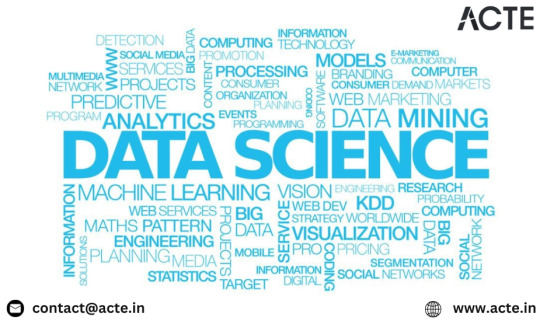
Embarking on the path of data science as a beginner may seem like a formidable task, but with the right resources and a structured approach, it becomes an exciting and achievable endeavor. From understanding the basics to building a portfolio of real-world projects, each step contributes to your growth as a data scientist. Embrace the learning process, stay curious, and celebrate the milestones along the way. The world of data science is vast and dynamic, and your journey is just beginning. Choosing the best Data Science courses in Chennai is a crucial step in acquiring the necessary expertise for a successful career in the evolving landscape of data science.
3 notes
·
View notes
Text
DataCamp List of Course Topic And Technology
DataCamp is a really nice site and app and this is a link to the a list of topics, courses and tech.��
The app is almost the best part, and works well on a phone. A user can take little tests of Python for interest and leaning towards Data Science applications, almost like a quiz game. The app is well made and easy to use for learning Python and other data science topics.
The main site has more materials, it looks like, and all kinds of projects and more full courses. DataCamp is very recommended and can be fun.
0 notes
Text
Comment apprendre le datascience en moins d'un mois?

Allô! Voudriez-vous avoir une compétence que tout le monde veut? Apprenez le datascience. Le datascience vous permet de collecter les données des entreprises et d'apprendre de ces données pour faire des projections bénéfiques. Oui bien bénéfique (20x ce que vous gagnez). Plein d'entreprises veulent cette compétence mais hélà ils sont en manque.
Selon les projections, le datascience est le métier le plus sexy que l'on ne puisse faire dans le monde d'aujourd'hui. Les statistiques montrent que les datascientists sont les ingénieurs les plus payés aux monde.
Cependant, si vous tombez dans les mains des instituteurs qui ne maitrisent pas leur sujet, vous allez croire que vous n'est pas fait pour devenir un ingénieur datascientist.
Il est cependant aussi facile d'apprendre le datascience que de conduire un vélo!
Inscrivez-vous sur Datacamp et voyez par vous même ce que je dis.
Bien de choses à vous.
0 notes
Photo

Datacamp provides 1-week free access to it's any of the course and its resources up to 22 May. Grab this opportunity and learn something in this lockdown to face the upcoming challenges. #machinelearning #datascience #dataanalytics #freecourse #python #ml #datascience https://www.linkedin.com/posts/pramod-sanghavi-27113b64_free-week-through-may-22-anyone-anywhere-activity-6668070792330391552-pDa1 (at PUNE पुणे MH 12) https://www.instagram.com/p/CAUuf6ug7OR/?igshid=3o20a3q53hm9
0 notes
Photo

Using DataCamp for getting familiar with Data Science concepts
This is a short preview of the article: I am sharing a collection of classes in DataCamp that may help you in getting familiar with data science concepts in a practical manner. DataCamp is a paid service, however, students can normally use it for free. Probably the university where you are studying have an institutional subscription
If you like it consider checking out the full version of the post at: Using DataCamp for getting familiar with Data Science concepts
If you are looking for ideas for tweet or re-blog this post you may want to consider the following hashtags:
Hashtags: #Data, #DataScience, #Datacamp, #Python, #Tensorflow
The Hashtags of the Categories are: #BigData, #MachineLearning, #Programming, #Python
Using DataCamp for getting familiar with Data Science concepts is available at the following link: https://francescolelli.info/machine-learning/using-datacamp-for-getting-familiar-with-data-science-concepts/ You will find more information, stories, examples, data, opinions and scientific papers as part of a collection of articles about Information Management, Computer Science, Economics, Finance and More.
The title of the full article is: Using DataCamp for getting familiar with Data Science concepts
It belong to the following categories: Big Data, Machine Learning, Programming, Python
The most relevant keywords are: data, Data Science, Datacamp, Python, Tensorflow
It has been published by Francesco Lelli at Francesco Lelli a blog about Information Management, Computer Science, Finance, Economics and nearby ideas and opinions
I am sharing a collection of classes in DataCamp that may help you in getting familiar with data science concepts in a practical manner. DataCamp is a paid service, however, students can normally use it for free. Probably the university where you are studying have an institutional subscription
Hope you will find it interesting and that it will help you in your journey
I am sharing a collection of classes in DataCamp that may help you in getting familiar with data science concepts in a practical manner. DataCamp is a paid service, however, students can normally use it for free. Probably the university where you are studying have an institutional subscription or, if that is not the case,…
0 notes
Link
#DataCamp #DataScience #BestWayToLearn
1 note
·
View note
Photo

How To Learn Data Science Smartly? http://ehelpdesk.tk/wp-content/uploads/2020/02/logo-header.png [ad_1] Hello All in this video we will ... #analyticsvidhyadatasciencecourse #androiddevelopment #angular #appliedaicourse #c #coursera #css #dataanalysis #datacamp #datascience #datasciencecourse #datasciencelearningpath #datasciencetutorial #deeplearning #development #docker #greatlearning #howtolearndatasciencequora #iosdevelopment #java #javascript #learnpythonfordatasciencefree #machinelearning #node.js #python #react #themostcomprehensivedatasciencelearningplanfor2018 #unity #upgrad #webdevelopment
0 notes
Text
120917 - Udemy and Datacamp
completed the Udemy python course: zero to hero today!
not too bad - and now i’m progressing to the next course Python for Data Science and Machine Learning Bootcamp - hope its fun!
what i’ve found pretty useful so far is Datacamp’s Importing & Managing Financial Data in Python - it’s a paid course (but since i’ve access through GA, why not? haha)
for those who are not subscribed, try this on Datacamp instead: Kaggle Python Tutorial on Machine Learning. i’m just barely scraped the surface on this, but pretty interesting so far!
---
my two cents: udemy’s good for learning the theory, datacamp’s pretty good at getting some insights into practical usage! a combination of both is important!
0 notes